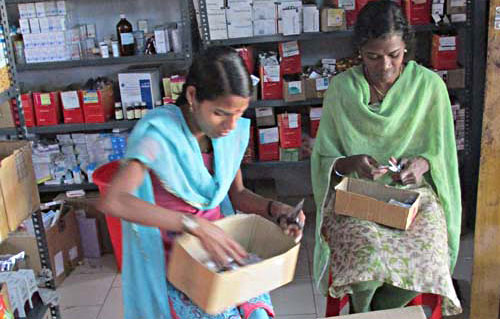Training Health Care Aides

Doctors are in short supply across rural India, since most prefer to work abroad or in urban areas after their medical training. As a result, many of India’s remote tribal villages are left without any access to health care. Depending on a tribal family’s financial resources, sick or injured family members may need to be carried long distances on foot, before finally being transported by bus or taxi to the nearest hospital. But even then, they are likely to find the hospital overcrowded, understaffed, or lacking adequate supplies and equipment.
Our volunteers are now pursuing a solution to this problem. Our own Amrita Hospital and Amrita Kalpetta Tribal Hospital trained 8 young men and women on how to provide basic medical services to tribal villages. These new healthcare aides were trained to measure patients’ vital signs, draw blood samples, and give first aid. They also learned about the symptoms and effects of diseases like sickle cell anemia, measles and chicken pox, and about the dangers of addiction. They even went to medical camps where they learned to dress various kinds of wounds, and had rotations in the pharmacy, patient registration, and the lab in which they practiced lab tests for cholesterol, pregnancy, and urine sugar levels.
Our new healthcare aides can even provide urgent care to tribal villagers, and educate them about healthy habits like good nutrition and hand-washing, and about the dangers of addiction, spitting, and open defecation. They have learned tablet technology as well, which they will use to access special health care apps, to screen medical awareness videos, and for record keeping. The aides also will be a valuable link between the remote villages and our medical establishment, as they can make use of telemedicine link-ups (medical treatment at a distance) and can call for organized medical camps, if needed.
These new healthcare aides are the very first graduates of our tribal medical training program. Despite having an education through high school, these youth reported that, prior to their training, they were unable to find work other than occasional manual or agricultural labor. Yet, these new graduates will have regular work. They will be placed in remote tribal villages in the Wyanad area. With the strong dedication the aides showed in their training, we expect them to accomplish great things and raise the standard of health in Wyanad.
